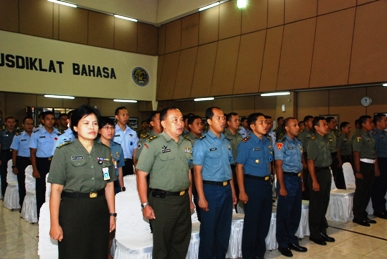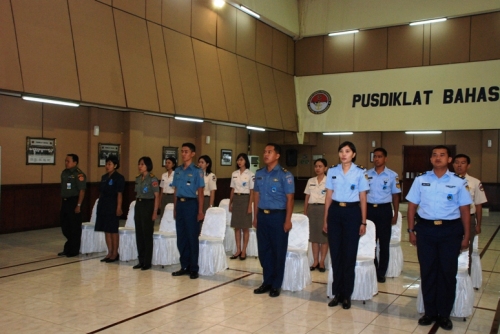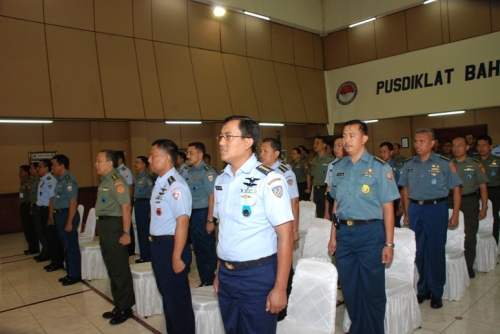On Tuesday, 11th of March KIBI LXXII was opened by Kapusdiklat Bahasa. There’re 72 students in all. They are military people and civiliants from Defence and Services and will be in Pusdiklat Bahasa for about 3 months to study about English language. All partisipants are staying in Pusdiklat Bahasa’s Mess. The expectation is that at the end of their course, they can use English to conduct their duty in the unit and of course to be able to communicate with the whole people from around the world. Happy study and good luck students.
KIBI LXXII’S OPENED, Join us
Posted in Uncategorized
DIBI XXXIV was opened
 On last Thursday 5th of March, DIBI XXXIV was opened by Kapusdiklat Bahasa. There are 12 students in all. 4 people are from Pusdiklat Bahasa, 1 from Balitbang Dephan, and the rest are from three services. They’ll spend about 5 months to study about the methodology in English teaching.
On last Thursday 5th of March, DIBI XXXIV was opened by Kapusdiklat Bahasa. There are 12 students in all. 4 people are from Pusdiklat Bahasa, 1 from Balitbang Dephan, and the rest are from three services. They’ll spend about 5 months to study about the methodology in English teaching.
Posted in Uncategorized
What’s on?
 Hi all visitors, long time no news and we’ve been missing you so. We’d like to inform you about what’s happening at Pusdiklat Bahasa now. Currently, we’re conducting a special KIBI for Attache Staff prior to their assignment to the target countries. They are 25 students in all.
Hi all visitors, long time no news and we’ve been missing you so. We’d like to inform you about what’s happening at Pusdiklat Bahasa now. Currently, we’re conducting a special KIBI for Attache Staff prior to their assignment to the target countries. They are 25 students in all.
That’s all for the time being and will text you soon.
Posted in Uncategorized
Happy Iedul Fitri
Posted in Instructors Said
Talking about advantages.
Advantages of Blogs to Teachers
- The use of blogs is a supplemental aid to the teacher. The amount of time students use their weblogs is at the discretion of the teacher. Students can use it once a semester to submit a paper, weekly for class assignments and notes, or anything in between.
- Computers in the classroom are not a prerequisite for the use of blogs. Thanks to the affordability of today’s computers and high speed Internet access, most students have Internet access at home. Many universities have computer classrooms and computer areas for students to access now.
- All of the teacher’s notes will be viewable together in chronological order. This is very convenient when preparing lessons that build upon previous material taught in the class.
- It is simple to edit class material if the text can be improved or if something new needs to be added.
- All student writing samples are kept in one place and can be read from any computer connected to the Internet at anytime.
- Teachers can give collective feedback to the class when a recurring mistake is found by adding entries to a “Writing Feedback” class blog. Additionally, individual feedback can be given to individual student blogs.
- In order to save time when giving feedback, save a copy of the messages at an additional teacher-only blog. If a class is taught for several years with different students, teachers might be able to recycle these messages. From this blog, the teacher can select the appropriate message to send to a student regarding their feedback to their homework and writing samples.
Advantages of Blogs to Students
- Students have access to your complete notes on the Internet. Students have the option of previewing the class material before class and reviewing the material after class.
- Because students are connected to the Internet, they have access to online English dictionaries. Students can easily look up words they do not understand by cutting the unknown word and pasting it into an online dictionary.
- Because the class material is organized into sections, students can easily find information.
- Students can read comments for the class as a whole and comments directed at them individually. This maximizes feedback and contact with the teacher.
- Students can observe how their writing has changed over time.
Posted in Instructors Said
International Night VII, 2008.
The Internasional night this time had the theme “promoting mutual understanding through languages and cultures “ (to promote mutual understanding among countries through the languages and the cultures) was followed by the Arabic student, Germany, Japan, Mandarin, Russia, England, Indonesia (the foreign student for the preparation course for the Staff and Command College) including the officers from India, Pakistan, South Korea, America, Australia, Singapore, Malaysia, the Philippines, Cambodia and Thailand.
Posted in Uncategorized
Happy Fasting everyone
Happy fasting
May Alloh be willingly blessing your study in KIBI.
Posted in Uncategorized
Top Down VS Bottom Up Management
When we start managing our English Language Center, every single teaching and learning package comes from “above” this then I name Top down management. Each and everyone involved in the program just “do” as instructed. Even it sound strange if someone is experimenting or improvising the teaching and learning methods. Most of us would not be surprised if instructors’ communication started with “well, what page have you been teaching now?” or ” what page is the next?” THAT’S ALL ABOUT. The practice has been haunting Pusdiklat Bahasa since the beginning of the creation of KIBI. So, it would have been more that 27 years of practice. I wonder how and why we still can live up ourselves with this situation, if we think that this is not “an acceptable circumstance” nowadays even when your KABADAN himself is not happy with. Whose top down management then has everyone practiced?
It is time for us to start thinking OUT OF THE BOX using the given package ONLY as one of billions learning resources and teaching methods hovering in this globe and beyond our virtual understanding of the very original concept of teaching and learning and using them altogether as our daily reference and then leaving the very shallow perspectives of NEW ALC and AELC package. WAKE UP and LOOK AROUND!!! This then what I call Bottom Up Management. An initiative and bravery to make a better change. It is time to improve and change.
Lastly stop being the “slave” of New ALC and AELC and its allies. They are good but they are not the only master to obey. Get other resources to live up your live and make your self a master of your own.
Good Luck.
Posted in Uncategorized
RATER and INTERPRETER COURSE or CURSE?
There are two courses for English instructors that are considered to be the ultimate course or curse. Firstly, RATER Course – a pretty much demanding training where the prospective participants are squeezed in to rate the ADFEPLS Test results. The tight timing and the number of various interview recordings; using real interview with ten different interviewees and interviewer are “deadly” combination for the participants to assess. The “torture” is not ending before another ten times two writing test results to be rated according to the given rating description. Another two rating activities focused on the Reading and Listening test results. These two are less likely seemed to be a big issue to worry.
Secondly, Interpreter Course – a very challenging course ever conducted at Pusdiklat Bahasa. As one of the graduates of the 1st Interpreter Course in 2001, I felt very proud of being one of a couple of the survivors. Indeed, Interpreter course that I was involved in was the most challenging course I have ever experienced. The instructors were Mr Barry Turner, a senior lecturer of RMIT Melbourne and Mr Dave Deck, a senior instructor of ADF Langs RAAF Williams Base Laverton. They are all NAATI accredited interpreters. With their intensive assistance during the course, all participants were exposed to a brand new knowledge of interpreting.
Having had the qualification of being Rater or Interpreter, one will get the heaps of benefit from their new status if they can manage their tasks. On the other hand, those who are not lucky to get the attribute will suffer from having been in the courses. This is because most of us still expect that having had Rater and Interpreter course means that one capable of performing RATING and INTERPRETING tasks which in fact NOT EVERYONE CAN.
Lastly to say, Rater and Interpreter Course can be an extraordinary opportunity those who are lucky enough to get through, but at the same time for those who are not eligible and qualified those courses will be CURSES. Who supposed to take the responsibility is a matter of looking at the potentials of self and the needs of the unit then we can never answer the question. What the most important issue to consider is better to keep the requirements of the both courses as a non-negotiable profile. If none of the prospective candidates meet the profiles, the courses shall not be conducted. This will save not only the future career of the prospective personnel but also the credibility of the unit where this person is assigned.
Posted in Uncategorized | Tags: course, curse, interpreter, Rater
Using Blog in the Classrom.
Using a blog in the class room, sound is great, isn’t it?But, the question is “how”. Some teacher has their own  blog but they don’t know to maximize the using of blog to teach their student in the class room. There are many ways to maximize your blog to support your teaching activity. Here we go :
blog but they don’t know to maximize the using of blog to teach their student in the class room. There are many ways to maximize your blog to support your teaching activity. Here we go :
1. Autobiographical writing : student can use the blog as a journal or day-to-day activity . Teacher ask them to report their daily life or their excursions(Ind: Ijin Berlibur).
2. Book journaling : Ask them to write their thoughts, responses, and opinions to the teacher’s or other student’s post.
3. As an information board : Informing student of important event such as homework, exercises or what to bring to class, student can comment for clarification.
4. Creative writing : Students write posts as a paper work or poetrys and constructively critique by other students.
5. Digital Portfolio :Student can record or save their paper work by uploading their works (embed to http://www.scribd.com)
6. Tracking a student’s thinking and comment as they completed any quiz or assignment.
There are six ideas using a blog to maximize the teacher’s teaching activity. Do you have another idea or opinion about it? It is better if we discuss this issues. Thanks.
Ikhien.
Posted in Instructors Said




